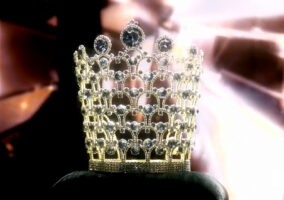War has driven right up to the front door of Downton Abbey, drastically upsetting the status quo and working its way into every corner of the house, much like the smell of Lady Mary’s burning hair caused by her new-fangled curling iron. From 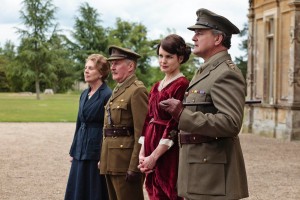 where to store the sheets to centuries-old class boundaries, it’s all up in the air and the people happiest about it are the people benefiting the most from it. Isobel is giddy at the change in the air, as well as the opportunities for power and the sight of aristocrats forced into egalitarian positions which leave them unsteady and frustrated. This is, we think, a rather unfortunate turn for this character, whose middle-class anxieties in the face of overwhelming aristocratic grandeur were so easy to identify with and character-defining in series one. Here, she’s boorish and practically alight with glee over her ability to order people around in Downton Abbey. There was nothing of this to be seen in last season’s Isobel and this 180 degree turnaround into very inappropriate behavior from someone who used to be concerned with how she appeared to her cousins is dizzying and a bit unfortunate. To us, she’s turned from a character who had some interesting complexities and insecurities into a foil to make the aristocrats look a little better, which is something Julian Fellowes does a little too often for our tastes.
where to store the sheets to centuries-old class boundaries, it’s all up in the air and the people happiest about it are the people benefiting the most from it. Isobel is giddy at the change in the air, as well as the opportunities for power and the sight of aristocrats forced into egalitarian positions which leave them unsteady and frustrated. This is, we think, a rather unfortunate turn for this character, whose middle-class anxieties in the face of overwhelming aristocratic grandeur were so easy to identify with and character-defining in series one. Here, she’s boorish and practically alight with glee over her ability to order people around in Downton Abbey. There was nothing of this to be seen in last season’s Isobel and this 180 degree turnaround into very inappropriate behavior from someone who used to be concerned with how she appeared to her cousins is dizzying and a bit unfortunate. To us, she’s turned from a character who had some interesting complexities and insecurities into a foil to make the aristocrats look a little better, which is something Julian Fellowes does a little too often for our tastes.
The early portions of the episode depicted a family deeply uncomfortable with and confused by the new arrangements in their home; all but Sybil, of course. There were degrees, in fact. You can draw a line from acceptance to begrudged 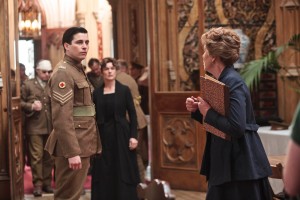 acceptance to near-outrage from Sybil to Edith to Mary, with Cora, Robert and Violet having increasingly more difficulty with it according to their age. There’s a generational thing at play here as well as a class one. Violet was more distressed by officers mixing with enlisted men and “putting everyone on edge” than she was with the change in living conditions.
acceptance to near-outrage from Sybil to Edith to Mary, with Cora, Robert and Violet having increasingly more difficulty with it according to their age. There’s a generational thing at play here as well as a class one. Violet was more distressed by officers mixing with enlisted men and “putting everyone on edge” than she was with the change in living conditions.
At first we were a bit impressed with the writers for being willing to depict the family reacting to the change in their lives in a less-than-saintly manner; Cora and Robert in particular (As an aside, there’s a truly jaw-dropping long take in this episode that starts with Cora in the main entry way looking at her ravaged household sadly, then joined by her husband, then it follows them out the front door as they greet the arriving military staff and the camera circles around the driveway and back into the house, following Thomas. It’s a stunning, cinematic bit of camera work in the middle of the episode that doesn’t deserve to go unremarked-upon just because we can’t find a good place to work it into this review). But then, sadly, the script took a rather easy way out by having Isobel become a foil for the whole family rather than just for Violet, turning her quite inexplicably into someone so devoid of common sense and manners that she’d actually push to have the family dog restricted after Lord Grantham already blew up at her. This bothers us – and not just because we always liked Isobel. It bothers us because it’s so cheap and easy to drive your plot forward if you’re just going to have your characters act in extreme and contradictory ways.
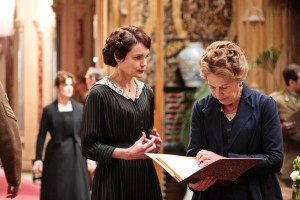 The overriding conversation about series 2 of Downton Abbey is going to revolve around the show’s perceived descent into soap-y plotting and unlikely developments. For us, that conversation got kicked into high gear with Mrs. Crawley’s odd behavior here, but it turned into a full-on shouting match when Thomas’ name came up as a candidate for running the hospital. This is absurd on so many levels that it’s a bit of an insult to the audience. If you give the audience indication that you believe they’ll accept practically anything you hand them, you’re likely to lose your audience’s interest rather rapidly. Thomas was fired from Downton for stealing after having tried to frame one servant, gotten into a fistfight with another in the kitchen, and gleefully cracked jokes about the lady of the house’s miscarriage to the horror of the staff. It’s wholly unbelievable that he’d even be allowed on the grounds after that, let alone be allowed to walk through the front door and handed any form of authority. We think there are ways to show that Isobel is sometimes pushy and we might even be convinced there is a plausible way to get Thomas back into the house, but neither of these developments seem very thought out and they’re mostly pushed very hard at the viewer along with a dizzying array of other plot developments, rapidly whizzing by.
The overriding conversation about series 2 of Downton Abbey is going to revolve around the show’s perceived descent into soap-y plotting and unlikely developments. For us, that conversation got kicked into high gear with Mrs. Crawley’s odd behavior here, but it turned into a full-on shouting match when Thomas’ name came up as a candidate for running the hospital. This is absurd on so many levels that it’s a bit of an insult to the audience. If you give the audience indication that you believe they’ll accept practically anything you hand them, you’re likely to lose your audience’s interest rather rapidly. Thomas was fired from Downton for stealing after having tried to frame one servant, gotten into a fistfight with another in the kitchen, and gleefully cracked jokes about the lady of the house’s miscarriage to the horror of the staff. It’s wholly unbelievable that he’d even be allowed on the grounds after that, let alone be allowed to walk through the front door and handed any form of authority. We think there are ways to show that Isobel is sometimes pushy and we might even be convinced there is a plausible way to get Thomas back into the house, but neither of these developments seem very thought out and they’re mostly pushed very hard at the viewer along with a dizzying array of other plot developments, rapidly whizzing by.
O’Brien continues to hold sway over Cora in a manner that also tends to contradict the latter character in certain ways. 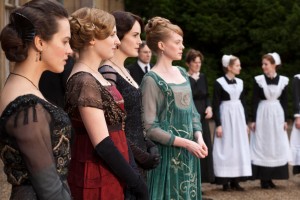 Cora’s presented as shrewd and sharp in so many other matters, but we’re supposed to accept that she instantly turns naive and gullible whenever she has a conversation with her ladies maid. In addition, for no possible good reason, it is revealed that Carson and Lord Grantham did not tell Cora why Thomas was fired and for some reason don’t feel they can tell her now. Why? No idea. Because the writers wanted Thomas to be in charge and that was that. Granted, the problems with Isobel helped along Thomas’ promotion, since Cora, Violet, Robert and Dr. Clarkson have all turned on her, but the end result was no less ludicrous.
Cora’s presented as shrewd and sharp in so many other matters, but we’re supposed to accept that she instantly turns naive and gullible whenever she has a conversation with her ladies maid. In addition, for no possible good reason, it is revealed that Carson and Lord Grantham did not tell Cora why Thomas was fired and for some reason don’t feel they can tell her now. Why? No idea. Because the writers wanted Thomas to be in charge and that was that. Granted, the problems with Isobel helped along Thomas’ promotion, since Cora, Violet, Robert and Dr. Clarkson have all turned on her, but the end result was no less ludicrous.
Meanwhile, Violet and Rosamund are pressing Mary to make the most of the news that Lavinia was involved in the Marconi shares scandal because they’re convinced she was Sir Richard’s lover. It’s not true and it’s to Mary’s credit that she didn’t follow through on her aunt’s insistence that she ruin Matthew’s engagement. The two women are becoming a little close, it seems. Lavinia is still intimidated by her but you can’t say Mary’s not making the effort or being unkind. “The truth is, we’re very much alike,” she tells Matthew. That’s perhaps overstating it, but we think Mary does genuinely like  Lavinia. Of course, it has to be noted that she spent a good deal of time passively entertaining the idea of ruining Matthew’s engagement, but clearly, she’s not so devious to try it. Besides, we think there’s a huge part of Mary that doesn’t want to seem like she wants Matthew or is in any way threatened by Lavinia. She’s so focused on making sure everyone believes it that she’s wound up convincing herself of it.
Lavinia. Of course, it has to be noted that she spent a good deal of time passively entertaining the idea of ruining Matthew’s engagement, but clearly, she’s not so devious to try it. Besides, we think there’s a huge part of Mary that doesn’t want to seem like she wants Matthew or is in any way threatened by Lavinia. She’s so focused on making sure everyone believes it that she’s wound up convincing herself of it.
In other Crawley daughter romance news, Sybil and Branson continue to blithely ignore boundaries and consequences. Sybil continues the apparent Crawley female tradition of falling for a man completely and utterly wrong and dangerous for her. If his politics, class, and Irishness weren’t reason enough for her to avoid him, his willingness to dump cowshit and oil on houseguests should give her pause. We liked the scene of Anna finding the note and running through the house trying to avert disaster. The show doesn’t make enough use of the house’s size like that; providing tension simply because it takes so long to get from one end of it to the other.
And while the lack of consequences for Branson’s behavior is pretty ludicrous, in a way we can’t help wondering if there wasn’t a sly point being made about the aristocracy when you juxtapose it with the fate of poor, shell-shocked Mr. Lang. You can do a lot as a servant at Downton Abbey and get away with it – carry a dead body the length of the house, have a criminal past, steal from the butler, attempt to dump cow shit on a guest, steal from the larder to pay off a blackmailing petty criminal – but showing emotions? That’ll have you packing your bags that night. These things just aren’t done.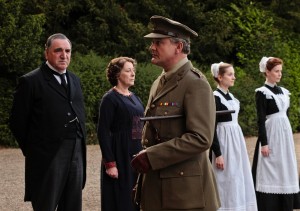
Bates and Anna reunite once again. Sort of. We have to say, these characters are presented as tragic lovers and for the most part, we buy it hook, line, and sinker; cheering at their triumphs and sniffling over their sadness; but if Anna was a friend of ours, we’d practically stage an intervention to get her to face up to the enormous number of red flags her beau is sending up. Come on now. At some point, when the problems keep piling up and there’s no payoff, the sweet dolor of love unconsummated becomes just plain annoying and patience wears thin. We’ve said before that we’re fine with their unrequited love because its opposite can be pretty boring in a serial drama. But at some point the sheer mountain of problems facing them and keeping them apart starts to become a little ludicrous. We’re not quite there yet, but when Bates was outlining yet another plan to deal with his wife, our Best Gay Friend instincts kicked in and all we wanted to do was grab her by the shoulders and say “Get out. NOW.”
Mrs. Patmore is racked with pain and regret over her nephew’s death, which is causing her to push Daisy into an extremely 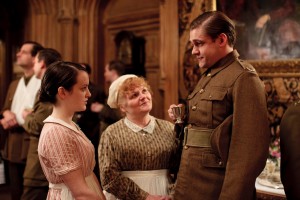 uncomfortable position. We have to give the writers a bit of credit here, because Daisy and William are pretty much two of the most adorable and likeable of all the characters and a potential romance has been pushed since Day One. To have it come to fruition only to find out one of them just doesn’t feel that way about the other is unexpected and a little brave. As bad as Mrs. Patmore’s being about the whole thing, it’s hard not to get just a little frustrated with Daisy, even though that’s terribly unfair to her. And of course, it’s heartbreaking watching William once again being pretty clueless about what’s going on around him, knowing that if he ever found out he’d be shattered by it. Nice bit of downstairs melodrama there.
uncomfortable position. We have to give the writers a bit of credit here, because Daisy and William are pretty much two of the most adorable and likeable of all the characters and a potential romance has been pushed since Day One. To have it come to fruition only to find out one of them just doesn’t feel that way about the other is unexpected and a little brave. As bad as Mrs. Patmore’s being about the whole thing, it’s hard not to get just a little frustrated with Daisy, even though that’s terribly unfair to her. And of course, it’s heartbreaking watching William once again being pretty clueless about what’s going on around him, knowing that if he ever found out he’d be shattered by it. Nice bit of downstairs melodrama there.
A potential bit of downstairs melodrama is being forecast pretty heavily with Ethel’s infatuation with one of the officers. It’s not at all hard to figure out where this one’s going. It only remains to be seen if the writers can do something surprising.
And finally, Lady Edith has her very best day ever and it surprised us how pleased we were for her. There’s been a nice little turnaround for this character, even though that business with the farmer last week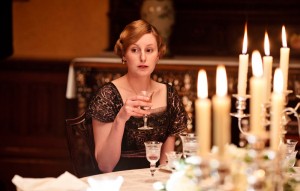 was embarrassing. She’s gone from pathetic, to nasty, to even more pathetic, and now she’s just an insecure young woman looking to figure her life out and desperate for a little bit of recognition. Yes, she’s careened around the plot as much as any of the other characters, contradicting herself and forgetting her own motivations whenever they’ve been inconvenient to the writers, but this arc felt earned and the outcome enjoyable. We can take all kinds of unlikely character turns, coincidences and events because to us, this show has always been a fairly well-acted soap opera with really pretty clothes. When these things don’t feel earned or are paced in a way that has the viewer’s head spinning or they openly contradict either the character or just plain common sense (Thomas? Really, Cora?), that’s when the show gets a little irritating and disappointing.
was embarrassing. She’s gone from pathetic, to nasty, to even more pathetic, and now she’s just an insecure young woman looking to figure her life out and desperate for a little bit of recognition. Yes, she’s careened around the plot as much as any of the other characters, contradicting herself and forgetting her own motivations whenever they’ve been inconvenient to the writers, but this arc felt earned and the outcome enjoyable. We can take all kinds of unlikely character turns, coincidences and events because to us, this show has always been a fairly well-acted soap opera with really pretty clothes. When these things don’t feel earned or are paced in a way that has the viewer’s head spinning or they openly contradict either the character or just plain common sense (Thomas? Really, Cora?), that’s when the show gets a little irritating and disappointing.
UPDATE: For a slightly different, more class-oriented version of our thoughts on this episode, check out our post on the Huffington Post here.
As with all of these Downton Abbey posts, we ask that you refrain from any spoilers in the comments section if you’ve seen this season. That includes vague comments like “If you think things are bad for X and Y now, wait till you see what happens!” Just talk about this episode or any episodes that preceded it, thank you.
[Photo Credit: Carnival Film & Television Limited 2011 for MASTERPIECE]
Revenge S1E12: Infamy Next Post:
Glee: Yes/No
Please review our Community Guidelines before posting a comment. Thank you!

